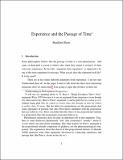| dc.contributor.author | Skow, Bradford | |
| dc.date.accessioned | 2012-09-28T15:13:33Z | |
| dc.date.available | 2012-09-28T15:13:33Z | |
| dc.date.issued | 2011-12 | |
| dc.identifier.issn | 1520-8583 | |
| dc.identifier.issn | 1520-8583 | |
| dc.identifier.uri | http://hdl.handle.net/1721.1/73471 | |
| dc.description.abstract | Some philosophers believe that the passage of time is a real phenomenon. And
some of them find a reason to believe this when they attend to features of their
conscious experience. In fact this “argument from experience” is supposed to be
one of the main arguments for passage. What exactly does this argument look like?
Is it any good?
There are in fact many different arguments from experience. I am not sure
I understand them all. In this paper I want to talk about the three most interesting
arguments that I do understand. I am going to argue that all three of them fail. | en_US |
| dc.language.iso | en_US | |
| dc.publisher | Wiley Blackwell (Blackwell Publishing) | en_US |
| dc.relation.isversionof | http://dx.doi.org/10.1111/j.1520-8583.2011.00220.x | en_US |
| dc.rights | Creative Commons Attribution-Noncommercial-Share Alike 3.0 | en_US |
| dc.rights.uri | http://creativecommons.org/licenses/by-nc-sa/3.0/ | en_US |
| dc.source | MIT web domain | en_US |
| dc.title | Experience and the passage of time | en_US |
| dc.type | Article | en_US |
| dc.identifier.citation | Skow, Bradford. “EXPERIENCE AND THE PASSAGE OF TIME.” Philosophical Perspectives 25.1 (2011): 359–387. | en_US |
| dc.contributor.department | Massachusetts Institute of Technology. Department of Linguistics and Philosophy | en_US |
| dc.contributor.mitauthor | Skow, Bradford | |
| dc.relation.journal | Philosophical Perspectives | en_US |
| dc.eprint.version | Author's final manuscript | en_US |
| dc.type.uri | http://purl.org/eprint/type/JournalArticle | en_US |
| eprint.status | http://purl.org/eprint/status/PeerReviewed | en_US |
| dspace.orderedauthors | Skow, Bradford | en |
| dc.identifier.orcid | https://orcid.org/0000-0002-7892-4540 | |
| mit.license | PUBLISHER_CC | en_US |
| mit.metadata.status | Complete | |
